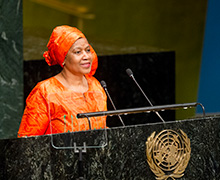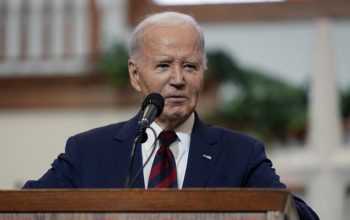news
GFDD/Funglode Call for Improved Access of Women to the Labor Market During the 61st Session of the Commission on the Status of Women
March 28, 2017
GFDD / Fundación Global Democracia y Desarrollo (Funglode) participated in the 61st Session of the Commission on the Status of Women (CSW61) which convened from 13-24 March 2017, at United Nations Headquarters in New York City. The Commission which opened on Monday March 13, under the priority theme “Women’s Economic Empowerment in the Changing World of Work”, held its last day of negotiations on Friday March 24, when it adopted by
consensus the Agreed Conclusions, highlighting barriers that women face, such as unequal working conditions, women’s over-representation in the informal economy, gender stereotypes, and social norms that reinforce women’s concentration in certain sectors of work.
Throughout the CSW61 conference, several high-level panels were organized and expertspeakers took the floor to emphasize the priorities of the commission and the progress made to
date in achieving them.The elected Chair of CSW61, H. E. Antonio De Aguiar Patrio of Brazil, underscored the relevance of this year’s theme, given that the fast-changing world of work can be an opportunity to empower women. The elected Chair also stressed that men and boys should advocate for gender equality arguing that “gender equality can only be achieved if men and boys are working side by side with women and girls”.
The Secretary-General of the United Nations Antonio Guterres joined H.E. Antonio De Aguiar Patrio in
encouraging men to commit to gender equality. “I have to admit, I am a man. But we need all men to stand up for women’s empowerment. Our world needs more women leaders”, he added.
The President of the UN’s Economic and Social Council (ECOSOC) and Permanent Representative of Zimbabwe Frederick Musiiwa Makamure Shava, called for the full and effective implementation of the Beijing Declaration and Platform of Action of 1995, calling for gender equality.
Issuing words of caution, Mr. Peter Thompson, President of the General Assembly, made reference to the Beijing Declaration and stated that “Progress have been slow, and gender equality is still a goal, not a reality”. He then reaffirmed that the 2030 Agenda for Sustainable Development
was suffused with the logic of gender equality.
Following these statements, Ms. Phumzile Mlambo-Mgcuka, UN Under-Secretary-General and Executive Director of UN Women for the 61st session of the CSW, took the floor to remind participants of the remaining barriers which prevent women’s empowerment. “More than half of all women workers around the world – and up to 90% in some countries – are informally employed. We cannot ignore them” she
cautioned.
The regional groups of countries, also part of G77, made interventions during the plenary to underscore their efforts on these issues. The African group stressed the accentuating efforts they had made on women and youth. In particular, they focused on the need for “Women’s empowerment by strengthening education and creating decent work for women” explaining that already “more than 60% of women participate in the informal
economy” with Agriculture providing most of these jobs. The representative from El Salvador made a statement on behalf of the Caribbean Community stressing the region’s “commitment to promoting gender equality”. The representative noted the “importance to strengthening and enhancing access to women to education, including equal pay for equal work”.
On Friday March 17, the Dominican Republic released a voluntary
presentation during the interactive dialogue dealing with “Challenges and achievements in the implementation of the Millennium Development Goals (MDGs) for women and girls”. The document, untitled “Institutionalization of the gender perspective in public policies in the Dominican Republic”, described national measures implemented to achieve gender equality, from the MDGs to the Sustainable Development Goals (SDGs) to achieve by 2030.
Taking the opportunity of CSW61 to raise awareness on social issues currently subjugating women and marginalized groups in Latin America and the Caribbean and the role of civil society in this debate GFDD/Funglode, partnered with John Jay College of Criminal Justice and hosted a side event at UN Headquarters, on Wednesday March 22. The panel discussed mass incarceration, systemic justice,
policing issues, and their impact on women and marginalized communities, in front of an audience of more than 150 attendants.
GFDD also participated in the main plenary discussions of CSW 61 as GFDD UN Programs Manager, Marc Jourdan submitted a joint statement on behalf of GFDD and Fundación Global Democracia y Desarrollo (Funglode). In his statement, Jourdan reminded delegates that “Women in Latin America are still underrepresented in scientific and
technological circles, underscoring the need for governments and other stakeholders to implement projects that can address this imbalance”. Highlighting the continuing challenge facing women who seek to access the labor market, Jourdan called for changes to release women’s potential as agents of change in driving innovative solutions for sustainable development.
A copy of the statement is available in English here and in Spanish here.
About the Commission on the Status of Women:
The Commission on the Status of Women (CSW) is the principal global intergovernmental body exclusively dedicated
to the promotion of gender equality and the empowerment of women. Since 1946, the CSW is instrumental in promoting women’s rights, documenting the reality of women’s lives throughout the world, and shaping global standards on gender equality and the empowerment of women.
More than 8.500 pre-registration were received for the 61st Commission on the Status of Women. This new record of participation expresses the growing interest of the civil society
around the CSW.







